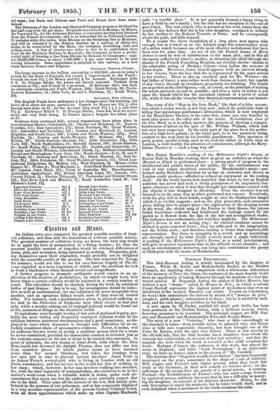Mrs. Fanny Kemble's reading of the Midsummer Night's _Dream, at
Exeter Hall on Monday evening, drew as great an audience as when the Messiah or Elijah is performed there : a strong proof of progress in the intellectual and artistic tastes of the public, for the entertainment was void of any vulgar theatrical attraction. Mendelssohn's music—per- formed under Benedict's direction by as fine an orchestra and chorus as London could produce—afforded as refined an enjoyment as the reading itself. All the world knows how beautiful that music is, but an English audience has never had such a lively perception of its exquisitely dra- matic character as when it was thus brought into immediate contact with the objects it was designed to illustrate. Even the overture was not listened to in the same way as when performed at a concert. Everybody, with the play full in their minds, caught at once the Shakspexian images which it so vividly suggests ; and as the play proceeded, each successive piece, falling into its proper place—the night-scene of the sleeping lovers in the wood, the choral song of the Fairies to their Queen, the joyous bridal festivities—reflected and heightened the feelings roused by the poetry as it flowed from the lips of the fair and accomplished reader. The audience were enthusiastic, and well they might be. The Midsummer Night's Dream is not an acting play ; its etherial creations cannot be clothed in gross corporeal forms ; they are addressed to the imagination, not the bodily sense ; and therefore reading is better than impracticable representation. But there is sympathy in a crowd, and an assemblage are strongly excited by what would scarcely move a single individual. A reading of the Midsummer Night's Dream, as a social entertainment, will'give us greater enjoyment than in the solitude of our chamber ; and such an entertainment, moreover, can bring into combination the poetry of Shakspere with the music of Mendelssohn.


































 Previous page
Previous page